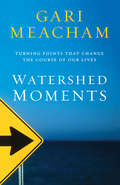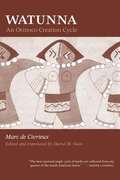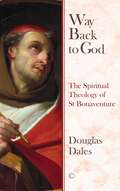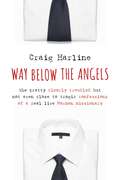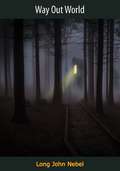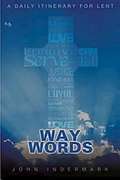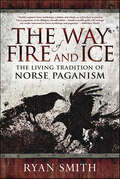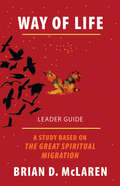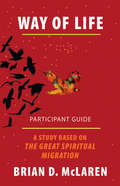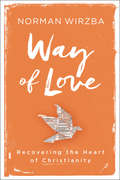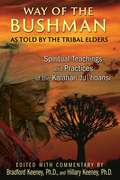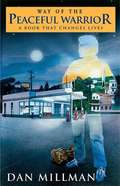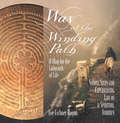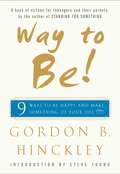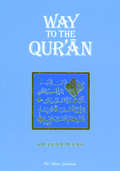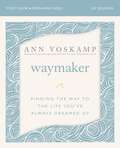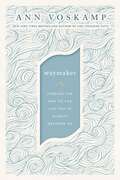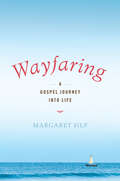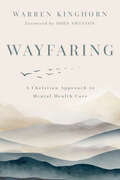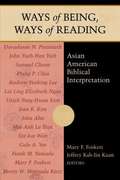- Table View
- List View
Waters of Marah
by Sylvia BambolaFor 28 years, Gloria Bickford has lived under the thumb of her overbearing mother. Only twice during that time has Gloria ever had the courage to defy her-when she accepted Jesus as Savior and when she moved into her own apartment. Gloria is about to do it a third time by refusing to marry the man her mother has picked for her and by moving out of town. But after she moves, things quickly go from bad to worse. First, Gloria's neighbor commits suicide. Then Gloria discovers her boss is not quite the man she thought he was. Things continue to heat up when Perth, a semi-runaway, semi-juvenile delinquent attaches herself to Gloria and then again when the radical environmentalists come to town. All these elements combine to create a moral crisis for Gloria and place her in a position where she stands to lose everything.
Watershed Moments: Turning Points that Change the Course of Our Lives
by Gari MeachamOur lives consist of moments. Stitched together like the seams on a coat, these moments cloak us in awareness and possibility. But what if we miss our moments? What if we live in a bland state of wandering? Seeking growth, seeking passion—but missing the moments in which God tries to pull the thread through the cloth in the way we’ve dreamed of? Watershed moments are the turning points in our lives brought on by circumstances which stop us in our tracks. A new direction; a fresh perspective; an answered prayer; a humble surrender—these are the moments that redirect us; leaving us profoundly changed. Through a progression of seven types of Watershed moments (the Watersheds of change, unraveling, rebuilding, purpose, abandoning [control], overcoming, and belief), Gari portrays life as a series of moments we encounter where we can face or turn away from change. A life marked by Watershed moments starts from the place where we live desperately hoping for some kind of new and freeing adventure. Through the lives of Abraham, David, Rebekah, Jacob, Rachel, Nehemiah, Peter and many more, as well as through personal Watershed moments in her life and the lives of several women who have written their own stories, Watershed Moments is a bold invitation to pay attention to the revelation God gives in the twinkling of a second at our moments of change. God uses watershed moments to position us to go one direction
Watunna
by Marc De CivrieuxOriginally published in Spanish in 1970, Watunna is the epic history and creation stories of the Makiritare, or Yekuana, peoples living along the northern bank of the Upper Orinoco River of Venezuela, a region of mountains and virgin forest virtually unexplored even to the present.
Waves of Light (Faithgirlz / From Sadie's Sketchbook)
by Naomi KinsmanWhere is God when you need him? After struggling to fit into a new town and school, Sadie faces questions about her faith, family, and friendships, questioning all she has come to believe. Sadie’s life is spinning out of control. Her friend moved away, her mom remains ill, and her dad wants to leave town. At least the play Sadie is helping produce appears to be going well. After all, she gets to create the sets with her art teacher’s help. But even that falls apart when a flash flood destroys her teacher’s home and art. How can she trust or even believe in a God who would allow all this? God isn’t fair. With everything crumbling and her faith on the edge, Sadie must find strength in the God she’s questioning in order to hold on in the midst of her struggles.
Way Back to God: The Spiritual Theology of Saint Bonaventure
by Douglas DalesBonaventure was a great pastor and preacher, and also a very effective teacher. His writing shows clarity and conviction, and his authority arose from his profound grasp of Scripture and patristic monastic tradition. The force behind how he wrote sprang from his keen sense of the significance of Francis and Clare and all that flowed from them, not least into his own spiritual life and experience as a person of deep contemplative and mystical prayer. <p><p>Way Back to God is a comprehensive conspectus and study of how Bonaventure taught Christian theology and applied it to spiritual life. It is intended to be a guide through most of his writings (though not as a substitute for reading them). It provides a bridge into his thought, and also a remarkable hand-book of Christian theology in its bearing upon spiritual life. <p><p>Douglas Dales' new work enables Bonaventure's distinctive spiritual theology to be seen as a whole, as well as making his writings, in Latin or English, accessible and attractive.
Way Below the Angels: The Pretty Clearly Troubled But Not Even Close to Tragic Confessions of a Real Live Mormon Missionary
by Craig HarlineWhen Craig Harline set off on his two-year Mormon mission to Belgium in the 1970s, he had big dreams of doing miracles, converting the masses, and coming home a hero. What he found instead was a lot of rain and cold, one-sentence conversations with irritated people, and silly squabbles with fellow missionaries.From being kicked -- literally -- out of someone's home to getting into arguments about what God really wanted from Donny Osmond, Harline faced a range of experiences that nothing, including his own missionary training, had prepared him for. He also found a wealth of friendships with fellow Mormons as well as unconverted locals and, along the way, gained insights that would shape the rest of his life.Part religious history, part coming-of-age story, part witty spiritual memoir, this book takes readers beyond the stereotypical white shirts and name tags to reveal just how unpredictable, funny, and poignant the missionary life can be.
Way Out World
by Long John NebelThe bizarre bestseller by the man who talks to time travelers, faith healers, Venusians, spiritualists and other denizens ofTHE WAY OUT WORLDEXTRA-SENSORY PERCEPTION...UNIDENTIFIED FLYING OBJECTS...VISITS TO OTHER PLANETS...EXTRA-TERRESTRIAL VISITORS...HEALERS...REINCARNATION...SPIRITUALISM, MEDIUMS & MYSTICS...STRANGE CREATURES OF THE EARTH...TIME TRAVEL...UNUSUAL INVENTIONSFor six years, “Long John Nebel” has been interviewing his “way out worlders” on his free-swinging radio and TV show. For instance you’ll meet Orfeo Angelucci, who followed a red glow that turned into two green balls with a voice coming from them, and his experiences with five-inch blondes. There’s Otis T. Carr, who will build you an “OTC-XI Circular Foil Spacecraft” for a mere twenty million dollars. You’ll be introduced to magician Dr. William Neff who faded away to invisibility on the Paramount Theatre stage and insisted he didn’t even know it happened! This provocative, fascinating book is the result of “Long John’s” 10,000 hours of interviewing people.
Way Words: A Daily Itinerary for Lent
by John IndermarkScripturally-based readings to complement your Lenten journey. The Way this most ancient naming of the Church in the Book of Acts reminds Christians we are a people on a journey of faith. But what signposts might guide us on this way? Way Words provides an itinerary of daily readings based on scripture for the journey we make during the season of Lent. Each of its daily readings, starting with Ash Wednesday and concluding with Easter Sunday, will explore one concise phrase or verse from the Old or NewTestament that offers a spiritual guidepost for modern-day disciples on the Way ofJesus Christ. Each of the short forty-seven readings includes a scripture excerpt, followed by a brief prayer or spiritual exercise. This resource is written for personal study and devotional use during Lent. Introductory reading: Ash Wednesday Week One: Holy Foundations Week Two: Godward Callings Week Three: Crucial Decisions Week Four: Community Fashionings Week Five: Faithful Practices Week Six: Enlarging Vistas HolyWeek: Saving Mysteries
Way of Fire and Ice: The Living Tradition of Norse Paganism
by Ryan Smith“Smith’s simple guide will enchant any reader interested in Norse mythology and paganism.” —Publishers WeeklyA Radical New Take On Norse PaganismThe Way of Fire and Ice reimagines Norse Paganism with mystical practices and rituals for today's world as well as tips for building community and resisting fascism. This approach to working with Norse deities and beliefs is a living, adaptable tradition, representing a strong alternative to the reconstructionist perspectives of Asatru and Heathenry. In these pages, the old ways come alive in a radically inclusive form. You will explore the secrets of the World Tree and the mysteries of the gods, work with the many spirits around us, and feel the deep rhythms that drive all life while creating new songs of power. You will also discover how to make these practices part of your every waking moment, developing your own personal spirituality and building healthy, sustainable communities along the way.“The Way of Fire and Ice offers a vision of an inclusive, welcoming, spiritually rich and socially responsible Norse Paganism. Written in a friendly, direct voice, this book presents a guided pathway for developing practice and community in this tradition.” ―Morpheus Ravenna, author of The Book of the Great Queen: The Many Faces of the Morrigan From Ancient Legends to Modern Devotions“The Way of Fire and Ice is Ryan Smith's magnum opus; a declaration of how we connect with the Gods while using that fire to transform our world.” ―Shane Burley, author of Fascism Today: What It Is and How to End It
Way of Life Leader Guide: A Study Based on the The Great Spiritual Migration (Way of Life)
by Brian D. McLarenThe study Way of Life will help groups approach and engage the spiritual, theological, and missional proposals in Brian McLaren’s book The Great Spiritual Migration. The Leader Guide contains everything needed to guide a group through the four-week study including session plans and discussion questions, scripture, prayer, opening activities as well as multiple format options.
Way of Life Participant Guide: A Study Based on The Great Spiritual Migration (Way of Life)
by Brian D. McLarenThe study Way of Life will help groups approach and engage the spiritual, theological, and missional proposals in Brian McLaren’s book The Great Spiritual Migration. This participant guide provides an introduction to the main text and can also stand alone with additional commentary and questions. The book also contains new content from Brian McLaren, including personal devotionals written to accompany each section.In The Great Spiritual Migration, Brian McLaren argues that in order to survive, Christianity must shift away from an outdated system of beliefs to a way of life based on love. In order to achieve this, McLaren outlines three migrations: spiritually, Christians focus less on doctrine and more on the abiding life of love made manifest in Jesus; theologically, a new way of reading Scripture shifts away from literalism and toward a more generous, literary approach; and missionally, the new way of life leads to "organizing religion," rather than organized religion, in which spiritual activists are committed to ecological, economic, and interfaith concerns.
Way of Love: Recovering the Heart of Christianity
by Norman WirzbaThe pioneering scholar and author of Food and Faith and Living the Sabbath asserts that Christianity has slid off its rightful foundation, arguing that the faith only makes sense and can only be expressed in a healthy way if it seen as based on love, with a mission of training others in the way of love.It's often said that God is love, yet his message of compassion and caring for others is often overshadowed by the battles dividing us politically, culturally, and religiously. Why does Christianity matter if it isn't about love? asks Duke University professor of Theology and Ecology Norman Wirzba.The Way of Love invites readers to experience Christianity that is centered on love. Extensive theological training cannot replace the way of love that transforms and connects each of us to God and the faith, Wirzba contends. Interweaving illuminating testimonials, historical references, and Scripture, he reveals how love allows us to move into the fullness of life; when we do not love we lose our faith. "To fail to love," he reminds us, "is to lose God."
Way of Peace: Exploring Nonviolence for the 21st Century
by Shannon McmanimonAnyone who has been paying attention knows that ours is a world filled with violence. This violence takes many forms: poverty, abuse, environmental destruction, war, hatred. We just ended the most blood-filled century in history. Could it be that our world has accorded violence the status of a religion? After all, our world tells and shows us to meet violence with violence, to fight fire with fire. Violence is glorified over and over again, in the media, in our national budgets, in our methods of dealing with personal problems.<P> Is there a better way? Can we end the glorification of violence? Can we challenge-and change-its status and begin to live in obedience to a different way of being in the world? What might this way--which many people have called "nonviolence"-look like? This book, attempting to answer some of these questions, is an introductory guide to the spirit and practice of nonviolence, the way of peace. It draws on the developing tradition of nonviolence in recent decades as practiced by Mohandas Gandhi and Martin Luther King, Jr. and Dorothy Day and Cesar Chavez and Lech Walesa and countless women and men in widely scattered parts of the world. All of these people experimented with another method for constructive social change, of peacemaking in the face of conflict, of an alternate way of living their personal lives.
Way of the Bushman: Spiritual Teachings and Practices of the Kalahari Ju/’hoansi
by Bradford Keeney Hillary KeeneyThe first comprehensive presentation of the core teachings of the Kalahari Bushmen as told by the Tribal Elders • Reveals how the Bushmen are able to receive direct transmissions of God’s love for healing and spiritual transformation • Explores tribal legends and teaching tales, the importance of dreams and animals, and the origins of their dances, rituals, and ceremonies Step into the imaginative realm of one of the oldest continuous cultures on Earth, the Kalahari Ju/’hoansi Bushmen. Translated by Beesa Boo, a Bushman, and interspersed with detailed commentary from Bradford and Hillary Keeney, this book presents the core teachings of the Kalahari Bushmen as told by the tribal elders themselves. Decades in the making, it constitutes the first comprehensive work on the world’s oldest tradition of healing and spiritual experience. Told in their own words, these teachings reveal how the Bushmen are able to receive direct transmissions of God’s love in the form of the universal life force, n/om. The individuals who are filled with this force describe it as an awakened, energized feeling of love that inspires a spontaneous and heightened ecstatic awareness that opens mystical perception. Having your heart transfixed by this force enables true healing and spiritual growth to occur. Experiencing the force in your entire being, through a vision of “God’s egg”, awakens deep spiritual wisdom and extraordinary healing gifts. Those who “own the egg” are blessed with the ability to have direct communication with the Divine, a “rope to God,” and can communicate with others for all “ropes” are connected. Conveying the deep love that is the dominant emotion of Bushman spirituality, the book explores tribal legends and teaching tales, the importance of dreams and encounters with animals, the origins of their dances, such as the giraffe dance, and specific rituals and ceremonies, including puberty rites for boys and girls. “As the elder teachers of the Ju’/hoan Bushman (San) people, we hold the most enduring traditional wisdom concerning healing and spiritual experience. This book is a testimony of our ecstatic ways. We happily share our basic teachings about spirituality and healing with those whose hearts are sincerely open.”
Way of the Peaceful Warrior: A Book That Changes Lives
by Dan MillmanWay of the Peaceful Warrior's enduring appeal has as much to do with the author's compelling personal story as with his message. Dan Millman's journey began during a period of spiritual crisis when he met a powerful old warrior named Socrates at a gas station at 3 a.m., and found himself tempted by an elusive woman named Joy. Thus began an odyssey that led him to the concept of the "peaceful warrior"- and on toward a final confrontation that would either deliver or destroy him. His discovery that the life and practice of the peaceful warrior is action helped him make sense of his life and find a sense of purpose, which he was able to impart to others. For the peaceful warrior, the messages are simple but resonant: "What you give, you receive. Doing is understanding. And you can do anything when you find the heart and courage for it."
Way of the Winding Path
by M.A. Eve Eschner HoganWe spend lifetimes "looking for" our spiritual path as if it is something lost that we must find - we seek, rather than see that we are always on a spiritual journey.While we can not step off the path, we can certainly get lost and disoriented.Way of the Winding Path offers simple, practical steps for experiencing life as a spiritual pilgrimage, and serves as a map guiding you to find your way with ease, grace, and clarity. Through exploration of the labyrinth as a metaphor for life, one can discover essential skills: * Getting centered * Listening to the voice of God * Remembering who you are * Taking action in divine alignment * Celebrating transitions * Ritualizing everyday actionsThe light for illuminating the path already burns within you. Implementing the lessons from Way of the Winding Path will make your light glow more brightly as you make your unique journey through life.
Way of the Winding Path
by M.A. Eve Eschner HoganWe spend lifetimes "looking for" our spiritual path as if it is something lost that we must find - we seek, rather than see that we are always on a spiritual journey.While we can not step off the path, we can certainly get lost and disoriented.Way of the Winding Path offers simple, practical steps for experiencing life as a spiritual pilgrimage, and serves as a map guiding you to find your way with ease, grace, and clarity. Through exploration of the labyrinth as a metaphor for life, one can discover essential skills: * Getting centered * Listening to the voice of God * Remembering who you are * Taking action in divine alignment * Celebrating transitions * Ritualizing everyday actionsThe light for illuminating the path already burns within you. Implementing the lessons from Way of the Winding Path will make your light glow more brightly as you make your unique journey through life.
Way of the Winding Path
by M.A. Eve Eschner HoganWe spend lifetimes "looking for" our spiritual path as if it is something lost that we must find - we seek, rather than see that we are always on a spiritual journey.While we can not step off the path, we can certainly get lost and disoriented.Way of the Winding Path offers simple, practical steps for experiencing life as a spiritual pilgrimage, and serves as a map guiding you to find your way with ease, grace, and clarity. Through exploration of the labyrinth as a metaphor for life, one can discover essential skills: * Getting centered * Listening to the voice of God * Remembering who you are * Taking action in divine alignment * Celebrating transitions * Ritualizing everyday actionsThe light for illuminating the path already burns within you. Implementing the lessons from Way of the Winding Path will make your light glow more brightly as you make your unique journey through life.
Way to Be!
by Gordon B. Hinckley Steve YoungFrom one of the world's foremost spiritual leaders, an inspiring book that provides young adults and their parents with a game plan for leading a better life. This inspiring, upbeat, life-affirming book shows teenagers and their families how to navigate through the moral minefields of contemporary life and how to truly enjoy the opportunities and blessings that the modern world has to offer. Drawing upon his faith as well as his personal experience, Gordon B. Hinckley provides his readers with a game plan for discovering and embracing the things in life that are valuable and worthwhile. He shows how our lives are shaped by the decisions we make every day about personal behavior -- and he shows how to make the right decisions with the help of nine guiding principles. With its vivid anecdotes, invaluable precepts, and timeless wisdom,Way to Be!will be a source of both inspiration and practical advice for young people everywhere who want to lead better, fuller, more satisfying lives.
Way to the Qur'an
by Khurram MuradAn authoritative and accessible study guide that covers what the Book means to the believers and sets out the essential prerequisites of body, mind, and heart that serve to light up the inner life with the Qur'anic worldview; the etiquette of reciting, reading, and understanding the Qur'an; how to study the Qur'an collectively; and how to live by its teachings.Khurram Murad (1932-1996) was the director general of the Islamic Foundation, United Kingdom, and was a renowned teacher who spent forty years in the spiritual teaching and training of thousands of young Muslims around the globe.
WayMaker Bible Study Guide plus Streaming Video: Finding the Way to the Life You’ve Always Dreamed Of
by Ann VoskampFor every time you&’ve ever asked, &“Where are you God?&”When the story of our lives, the expectations of our one and only life, hasn&’t turned out to be quite what we always dreamed of, life can feel disorienting, as if we are being tossed and thrown by incoming waves and there&’s no way through. How do you navigate through the pounding storms of life with an internal calm and peace that is anchored and unwavering?Join New York Times best-selling author Ann Voskamp as she teaches you S.A.C.R.E.D., a daily habit, a rule of life, a way of life, that will reorient your soul in relation to God through Scripture and prayer and study. This powerful spiritual practice that Ann unpacks in this study will become your directing compass through the hard seasons where it feels like there is no way – only to find you have a WayMaker making an unexpected way into the life you only dreamed of. This study guide has everything you need for a full Bible study experience, including:The study guide itself - video teaching notes, group discussion questions, personal study and application of the life-changing SACRED habit, and a welcome letter from Ann for introducing each session.An individual access code to stream all six video sessions online (you don't need to buy a DVD!).Watch on any device!Streaming video access code included. Access code subject to expiration after 12/31/2027. Code may be redeemed only by the recipient of this package. Code may not be transferred or sold separately from this package. Internet connection required. Void where prohibited, taxed, or restricted by law. Additional offer details inside.
WayMaker: Finding the Way to the Life You’ve Always Dreamed Of
by Ann VoskampWe can trust that God, the WayMaker, is always at work creating the life of our dreams, through ways we never would have dreamed for ourselves.In a disorienting world, with obstacle after obstacle, and the landscape of our lives shifting in ways we never expected, we can trust that as we look to our Maker, the WayMaker, our road will lead us to arrive exactly where we always hoped it would, though maybe not at all in the way we imagined. And those dreams for our lives? They can still happen—in ways only He perfectly dreamed of. It is true: heartache, grief, suffering, obstacles, they all come in waves. There is no controlling life&’s storms; there is only learning the way to walk through the waves. In WayMaker, bestselling author Ann Voskamp hands us a map that makes meaning of life, that shows the way through to the places we&’ve only dreamed of reaching, by a way we never expected. Voskamp reveals how God is present in the totality of our lives, making a wayfor the marriage that seems impossible,for the woman who longs for a child of her own,for the parents who ache for the return of their prodigal,for the sojourner caught between a rock and a hard place, andfor the wayfarer who feels as though there is no way through to her dreams. We can encounter the WayMaker in surprising ways and begin to see Him not only making poetry out of pain but working in every miraculous detail of our lives. Even now, the Way is making the way to walk through waves and into a life more deeply fulfilling than our wildest dreams.
Wayfaring
by Margaret SilfInvites you to make your own journey of prayer and lived experience alongside Jesus, from his birth, through his earthly ministry, suffering and death, and into resurrected life.
Wayfaring: A Christian Approach to Mental Health Care
by Warren KinghornA theologically and scientifically engaged exploration of modern mental health care The current model of mental health care doesn&’t see people: it sees sets of symptoms that need fixing. While modern psychiatry has improved many patients&’ quality of life, it falls short in addressing their relational and spiritual needs. As a theologian and practicing psychiatrist, Warren Kinghorn shares a Christian vision of accompanying those facing mental health challenges. Kinghorn reviews the successes and limitations of modern mental health care before offering an alternative paradigm of healing. Based in the theology of Thomas Aquinas, this model of personhood affirms four truths: We are known and loved by God. We are creatures made of earth who are formed in community. We are wayfarers on a journey. We are called not to control, but to wonder, love, praise, and rest. Drawing on theological wisdom and scientific evidence, Kinghorn reframes our understanding of mental health care from fixing machines to attending fellow wayfarers on the way to the Lord&’s feast. With gentle guidance and practical suggestions, Wayfaring is an essential resource for pastors and practitioners as well as for Christians who seek mental health care.
Ways of Being, Ways of Reading: Asian American Biblical Interpretation
by Mary Foskett Jeffrey KuanWays of Being, Ways of Reading is a collection of essays that address biblical interpretation and the Bible's role from an Asian North point of view. Beginning with the history of biblical interpretation in Asian countries and cultures, this impressive collection by noted contemporary scholars, address issues and themes such as cultural hermeneutics, the politics of identity, and what constitutes Asian American theology. Contributors include: Devadasan N. Premnath, John Yueh-Han Yieh, Samuel Cheon, Philip P. Chia, Andrew Yueking Lee, Lai Ling Elizabeth Ngan, Uriah Yong-Hwan Kim, Jean K. Kim, John Ahn, Mai-Anh Le Tran, Sze-Kar Wan, Gale A. Yee, Frank M. Yamada, Mary F. Foskett, and Henry W. Morisada Rietz

